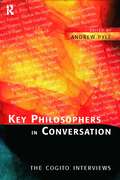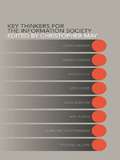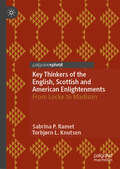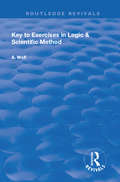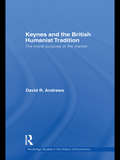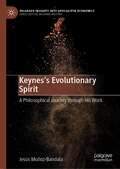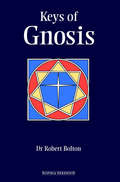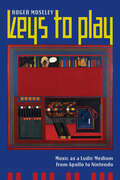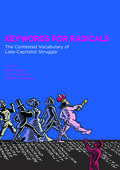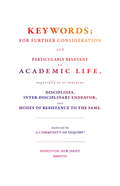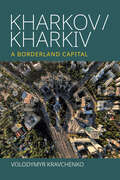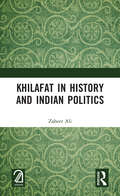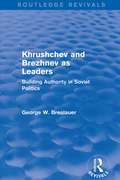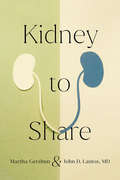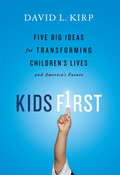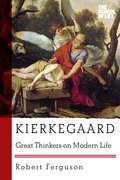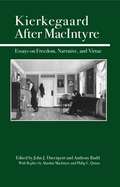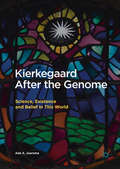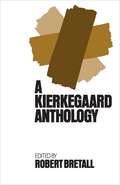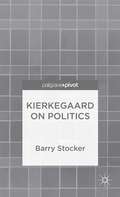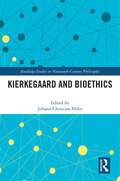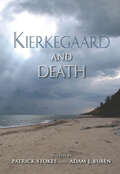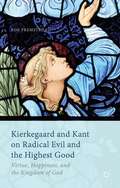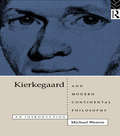- Table View
- List View
Key Philosophers in Conversation: The Cogito Interviews
by Andrew PyleKey Philosophers in Conversation is a fascinating collection of interviews presenting the ideas of some of the worlds leading contemporary philosophers. Each interview features a discussion with a key philosopher looking at philosophical issues such as; the philosophy of mind, ethics, science, political philosophy and the history of philosophy. Those interviewed are; W.V.O Quine, Michael Dummet, Mary Warnock, Hilary Putnam, Alasdair MacIntyre, Daniel Dennett, Martha Nussbaum, Roger Scruton, Bernard Williams, Jean Hampton, Richard Dawkins, Derek Parfit, Peter Strawson, David Gauthier, Hugh Mellor, John Cottingham, Adam Morton, Stefan Korner, Richard Sorabji and Nancy Cartwright. This book offers an excellent insight to contemporary philosophy and is ideal for anyone seeking an introduction to what is happening in Philosophy today.
Key Thinkers for the Information Society: Volume One
by Christopher MayKey Thinkers for the Information Society provides an introduction to some important social theorists whose work has considerable relevance to today's 'brave new world' of information and communication technologies. With the aim of widening current perspectives on the information society, each contributor introduces a particular theorist and discusses the way in which their insights can be reintroduced into debates regarding the social, political and cultural impact of ICTs. Theorists presented in Volume 1 include some well-known and some less well-known figures: Walter Benjamin; Murray Edeleman; Jacques Ellul; Harold Innes; Lewis Mumford; Karl Polanyi; Eric Elmer Scattachneider and Raymond Williams. Each has something fresh and pertinent to say and taken as a whole this volume provides an exciting new resource for contemporary studies.
Key Thinkers of the English, Scottish and American Enlightenments: From Locke to Madison
by Sabrina P. Ramet Torbjørn L. KnutsenThis book summarizes and explains the way in which political thinkers in England, Scotland, and North America reshaped Western thinking about government and citizens. Although the ideas of the Anglo-American Enlightenment can be traced back, in embryo, to the Italian Renaissance and the Protestant Reformation, it was responses to wars – the Thirty Years’ War (1618-1648) and the English Civil War (1642-1651) which were fought above all over religion – that defined it. Algernon Sidney demanded an end to royal absolutism. John Locke called for a government based on religious toleration. Benedictus de Spinoza, Samuel von Pufendorf and others elaborated on the ideas that society was composed of sovereign individuals endowed with reason and rights. Building on the works of these thinkers, Scottish philosophers including David Hume and Adam Smith, and American revolutionaries including Thomas Jefferson and James Madison advanced arguments defending human reason, individual freedom, including religious freedom, and democracy.
Key to Exercises in Logic and Scientific Method (Routledge Revivals)
by A. WolfOriginally published in 1926, this book was written in the first instance for the benefit of those students of Logic and Scientific Method who receive insufficient or no help in the way of oral instruction. The main function of the following pages is to deal with the exercises, as distinguished from the book-questions. It includes chapters on the scope of logic, theory of judgment and immediate inference, and theory of induction.
Keynes and the British Humanist Tradition: The Moral Purpose of the Market
by David AndrewsWell-connected in academia, business and government, John Maynard Keynes was one of the most influential economic theorists of the twentieth century. It appears that his theories will be just as important for the twenty-first. As Keynes himself explained, his ideas throughout his life were influenced by the moral philosophy he learned as an undergraduate. Nevertheless, the meaning and significance for Keynes of this early philosophy have remained largely unexplored. Keynes and the British Humanist Tradition offers an interpretation of Keynes’s early philosophy and its implications for his later thought. It approaches that philosophy from the perspective of the nineteenth century intellectual context out of which it emerged. The book argues that roots of Keynes’s early beliefs are to be found in the traditions of the Apostles, the very famous secret society to which he and most of his teachers belonged. The principles of Keynes’s philosophy can be seen in such writers as John Stuart Mill and Henry Sidgwick, but the underlying ideas have been obscured by changing fashions in philosophy and thus require excavation and reconstruction. This book will be of interest to students and researchers in the history of economics, in particular the thought of John Maynard Keynes, especially his ethics, politics and economics.
Keynes’s Evolutionary Spirit: A Philosophical Journey through His Work (Palgrave Insights into Apocalypse Economics)
by Jesús Muñoz-BandalaThis book chronicles the way Keynes’s generous philosophy of practice evolved in consonance with the needs of his epoch. From a youngster reflecting on ethics and the classics, to becoming a leading voice in both wars in terms of political philosophy and international relations, to playing the role of innovator in both probability and economics, to taking a stance as an art appreciator, Keynes’s life and multidisciplinary contributions to humankind were permeated by his philosophical milieu. However, only a flexible, dynamic, and broad philosophy could have reflected and led the economic and political events in the world of the first part of the 20th Century, which is what Keynes managed to accomplish, and that is what the book suggests. This book captures the gist of Keynes’ evolutionary philosophy for our times. The book adds an evolutionary perspective to the existing literature on Keynes. As a case in point, the theoretical foundations of both macroeconomics and laissez faire are dissected. But the book also tells the story of how Keynes’s philosophy is adapted to a convulsed world, which is akin to ours, his legacy being gifted with multiple human considerations. The book offers an outline of Keynes’s philosophical stance—also compared with those of other European thinkers—at a moment when new ethical, epistemological, economic, and political perspectives are required, especially after the crisis of 2020. The conclusion is that Keynes´s theoretical and practical insights were far ahead of his time.
Keys Of Gnosis
by Robert Bolton"For a long time now, religion in the West has been polarized between a democratic kind of faith meant for simple believers, and divine mysteries so high that hardly anyone can claim to know much about them. The vital connecting link between them, that of metaphysical religion, is all but lost..." (From the Introduction) There are many books that seek to answer the fundamental questions of life:Who am I? Does life have a purpose? How should I live? Dr Bolton's book brings to these universal questions an extraordinary degree of metaphysical insight. It contains in highly condensed form a veritable library of traditional wisdom, offering a systematic reconstruction of our understanding of the soul and its relation to archetypal reality. Its starting-point is the fact that increasing numbers of people seem to lack spiritual and material power over their own lives. Modern man feels like a victim. But true power, real freedom, is closer than we think. Our mistake lies in accepting a false view of the self, and neglecting the metaphysical dimension that gives access to eternity. Dr Bolton's book offers a crash-course in liberation. It can liberate us, specifically, from a common sense idea of reality which is profoundly false, and which holds us in unconscious slavery to time and appearances. The book defends the capacity of the human mind to obtain objective insight, despite the obfuscations of postmodernism, and represents a bold development of the Platonist tradition associated with St Augustine, Plotinus, and Proclus. "This book is like a diamond: a diamond placed not in a necklace, but at the business end of a drill. It is up to us to use the drill to penetrate reality. Writing the book was a great achievement. Reading it invites us to make the achievement our own." STRATFORD CALDECOTT Editor, Second Spring and Director (UK) of The G.K. Chesterton Institute for Faith & Culture Author of Secret Fire: The Spiritual Vision of J.R.R.Tolkien (DLT, 2003)
Keys to Play: Music as a Ludic Medium from Apollo to Nintendo
by Roger MoseleyA free ebook version of this title is available through Luminos, University of California Press’s Open Access publishing program for monographs. Visit www.luminosoa.org to learn more. How do keyboards make music playable? Drawing on theories of media, systems, and cultural techniques, Keys to Play spans Greek myth and contemporary Japanese digital games to chart a genealogy of musical play and its animation via improvisation, performance, and recreation. As a paradigmatic digital interface, the keyboard forms a field of play on which the book’s diverse objects of inquiry—from clavichords to PCs and eighteenth-century musical dice games to the latest rhythm-action titles—enter into analogical relations. Remapping the keyboard’s topography by way of Mozart and Super Mario, who head an expansive cast of historical and virtual actors, Keys to Play invites readers to unlock ludic dimensions of music that are at once old and new.
Keywords for Radicals: The Contested Vocabulary of Late-Capitalist Struggle
by A. K. Thompson Joy James Kelly Fritsch Clare O'Connor Silvia Federici"An extraordinary volume that provides nothing less than a detailed cognitive mapping of the terrain for everyone who wants to engage in radical politics. "—Slavoj Žižek, author of Living in the End Times "From its thought-provoking Introduction though its energizing accounts of the tensions underlying our most prized concepts, Keywords for Radicals will be indispensable to any scholar or activist who is serious about critique and change. "—Stephen Duncombe, editor of Cultural Resistance Reader In Keywords (1976), Raymond Williams devised a "vocabulary" that reflected the vast social transformations of the post-war period. He revealed how these transformations could be grasped by investigating changes in word usage and meaning. Keywords for Radicals—part homage, part development—asks: What vocabulary might illuminate the social transformations marking our own contested present? How do these words define the imaginary of today's radical left? With insights from dozens of scholars and troublemakers, Keywords for Radicals explores the words that shape our political landscape. Each entry highlights a term's contested variations, traces its evolving usage, and speculates about what its historical mutations can tell us. More than a glossary, this is a crucial study of the power of language and the social contradictions hidden within it. Contributors include Patrick Bond, Silvia Federici, John Bellamy Foster, Joy James, Ilan Pappé, Justin Podur, Nina Power, Mab Segrest, and more. Kelly Fritsch is a Banting Postdoctoral Fellow in Women's and Gender Studies at the University of Toronto. Clare O'Connor is a doctoral student in Communication at the University of Southern California. A. K. Thompson teaches social theory at Fordham University in New York.
Keywords;: For Further Consideration and Particularly Relevant to Academic Life, &c.
by D. Graham Burnett a Community of Inquiry Matthew Rickard Jessica TerekhovAn irreverent critical lexicon of academic life and cultureThe university: The very name evokes knowledge, culture, and the magnificently universal ambition at the heart of this essential institution. Bastions of free inquiry and a free society, engines of social transformation and economic progress, enclosed gardens of ennobling reflection and creation, universities encompass the wisdom of the past and the hope of the future. Or do they? This critical glossary—written by a group of Princeton graduate students and faculty—defines fifty-eight terms common to academic life in a style that will prick both egos and consciences. From “academia” to “vocation,” “canon” to “peer review,” “discipline” to “methodology,” the book scrutinizes the often stultifying structures of modern disciplinary life, calls out a slavish devotion to “knowledge production” as the enemy of thought, and even dissects the notion of “academic excellence.” Feisty and darkly funny, passionate and deeply insightful, this book raises hard questions about teaching, research, theory, practice, and academic labor. The result is a must-read dispatch from today’s academic trenches—one that is sure to provoke discussion and debate.
Kharkov/Kharkiv: A Borderland Capital
by Volodymyr KravchenkoKharkiv is Ukraine’s second largest city and its former capital. Situated within 40 km of the Ukrainian-Russian border it is one of those East-Central European “liminal” cities which became a center of modernization and pluralization in the borderland area, playing a prominent role in the process of nation building. Volodymyr Kravchenko’s expanded edition of Kharkov/Kharkiv, now in the English-language and including a new chapter on the reconfiguration of the Ukrainian-Russian borderland during and after the watershed Euromaidan event, uniquely uncovers the city’s long history, from the 17th century to today. Addressing issues of regional and national identities, Ukrainian-Russian relations, mental mapping, historical narratives and the ensuing de/reconstruction of national mythologies, this book, fills a unique gap in the literature on Kharkiv.
Khilafat in History and Indian Politics
by Zaheer AliThis book is a brief historical account of Khilafat, an Islamic political institution mired in controversies from its inception. It is an attempt to present an objective critique of the Islamic polity that, in a way, was primarily responsible for crafting schisms in Islam with its commencement. By the time the last Khilafat of the Ottomans came to an end in the aftershock of the Second World War, the Muslim political elite in India launched a movement for the restoration and continuation of the Ottoman Khilafat. The most paradoxical dimension of the issue was that in the Arab peninsula, the epicenter of Islam, the people were struggling to cast away the yoke of the Ottoman Khilafat, then why were the Indian Muslims emotionally involved in a movement that was vehemently condemned and assailed by a majority of Muslims outside the Indian subcontinent? This title is co-published with Aakar Books. Print editions not for sale in South Asia (India, Sri Lanka, Nepal, Bangladesh, Pakistan and Bhutan)
Khrushchev and Brezhnev as Leaders (Routledge Revivals): Building Authority in Soviet Politics
by George W. BreslauerFirst published in 1982, this book explores how Khrushchev and Brezhnev manipulated their policies and personal images as they attempted to consolidate their authority as leader. Central issues of Soviet domestic politics are examined: investment priorities, incentive policy, administrative reform, and political participation. The author rejects the conventional images of Khrushchev as an embattled consumer advocate and decentraliser, and of Brezhnev’s leadership as dull and conservative. He looks at how they dealt with the task of devising programs that combined the post-Stalin elite’s goals of consumer satisfaction and expanded political participation with traditional Soviet values.
Kidney to Share (The Culture and Politics of Health Care Work)
by Martha Gershun John D. LantosIn Kidney to Share, Martha Gershun tells the story of her decision to donate a kidney to a stranger. She takes readers through the complex process by which such donors are vetted to ensure that they are physically and psychologically fit to take the risk of a major operation. John D. Lantos, a physician and bioethicist, places Gershun's story in the larger context of the history of kidney transplantation and the ethical controversies that surround living donors. Together, they help readers understand the discoveries that made transplantation relatively safe and effective as well as the legal, ethical, and economic policies that make it feasible. Gershun and Lantos explore the steps involved in recovering and allocating organs. They analyze the differences that arise depending on whether the organ comes from a living donor or one who has died. They observe the expertise—and the shortcomings—of doctors, nurses, and other professionals and describe the burdens that we place on people who are willing to donate. In this raw and vivid book, Gershun and Lantos ask us to consider just how far society should go in using one person's healthy body parts in order to save another person.Kidney to Share provides an account of organ donation that is both personal and analytical. The combination of perspectives leads to a profound and compelling exploration of a largely opaque practice. Gershun and Lantos pull back the curtain to offer readers a more transparent view of the fascinating world of organ donation.
Kids First: Five Big Ideas for Transforming Children's Lives and America's Future
by David KirpA visionary call for renewing, revamping, and re-energizing public support for children--and why doing so is essential to America''s future
Kierkegaard (The\school Of Life Ser.)
by Robert FergusonSoren Kierkegaard was a Danish philosopher, theologian, literary stylist and social critic. Born in 1813 in Copenhagen, his philosophical work addressed living as a single individual and the importance of personal choice. A famously fierce critic of the idealist thinkers of his time, including Hegel, Goethe, and Hans Christian Anderson, he is regarded as the first existentialist philosopher, and his Fear and Trembling is one of the classics of modern philosophy. Here you will find insights from his greatest works, in the "Great Thinkers on Modern Life" series, which highlights ideas most relevant to ordinary, everyday dilemmas.
Kierkegaard After MacIntyre
by Alasdair Macintyre Philip L. Quinn John J. Davenport Anthony RuddIn his extraordinarily influential book on ethics, After Virtue, Alasdair MacIntyre maintained that Kierkegaard's notion of "choosing" to interpret one's choices in ethical terms implies an arbitrary and irrational leap. MacIntyre's critique of Kierkegaard has become the focal point for several new interpretations of Kierkegaard that seek to answer MacIntyre. Kierkegaard After MacIntyre brings together both new and already published articles in this vein, with a new reply by Professor MacIntyre.Kierkegaard After MacIntyre reflects the emergence of a new consensus in Kierkegaard scholarship. This consensus is strongly anti-irrationalist and contemporary neo-Aristotelian virtue ethics, clarifying their common ground as well as their differences.In responding to MacIntyre's 'irrationalist' objection, the authors clarify the sense in which Kierkegaard's own conception of freedom is teleological and suggest that his understanding of the development of ethical personality involves a quest for narrative unity, a commitment to practices involving social values, and a self-understanding conditioned by historical reality-all of which are also central themes in MacIntyre's work on virtue ethics. Despite MacIntyre's diagnosis of Kierkegaard's existential approach to ethics as unsuccessful, some of Kierkegaard's insights may support MacIntyre's own theses."Kierkegaard After MacIntyre is an outstanding book which brings Kierkegaard into direct conversation with one of the most important contemporary philosophers. The conversation contains both lively disagreements and illuminating analyses, all focused on issues of fundamental importance for human life." -C. Stephen Evans, Calvin College". . . this wonderfully edifying collection of essays." -Timothy P. Jackson, Emory University"In addressing MacIntyre's charge that for Kierkegaard the adoption of the ethical can only be a 'cirterionless choice,' this stimulating set of essays by well-known Kierkegaard scholars provides a welcome addition to the literature on Kierkegaardian ethics. Kierkegaard After MacIntyre provides a valuable exploration of the role of reasoning, will, and passion in moral life, as well as of the relation between aesthetic and ethical dimensions of life." -M. Jamie Ferreira, University of Virginia
Kierkegaard After the Genome
by Ada S. JaarsmaThis book brings S#65533;ren Kierkegaard's nineteenth-century existentialist project into our contemporary age, applying his understanding of "freedom" and "despair" to science and science studies, queer, decolonial and critical race theory, and disability studies. The book draws out the materialist dimensions of belief, examining the existential dynamics of phenomena like placebos, epigenetics, pedagogy, and scientific inquiry itself. Each chapter dramatizes the ways in which abstractions like "race" or "genes" and even "belief" are sites of contested practices with pressing political significance. Focusing on the existential dangers posed by neo-liberal and finance capitalist systems, the book brings to life the resources for resistance found within science studies and critical approaches to race, secularity, and disability. Throughout the book, Kierkegaard becomes an ally with ecological and developmental evolutionary theorists, as well as with science studies, critical race, and crip theorists who foreground the relational and impassioned nature of existence.
Kierkegaard Anthology
by Robert BretallThis anthology covers the whole of Kierkegaard's literary career. The selections range from the terse epigrams of the Journal through the famous "Diary of the Seducer" and the "Banquet" scene, in which Søren Kierkegaard reveals his great lyric and dramatic gifts, on to the philosophical and psychological works of his maturity. These are climaxed by the beautiful and moving religious discourses which accompany them; finally, there is the biting satire of his Attack upon "Christendom."This is emphatically not a collection of "snippets," but the cream of Kierkegaard, each selection interesting and intelligible in itself, and all ranking among his most important work. They are so arranged as to convey an idea of his remarkable intellectual development.Contents: A comprehensive anthology from the following works: Either/Or Fear and Trembling Stages on Life's Way Works of Love Concluding Unscientific Postscript Attack upon "Christendom" The Sickness Unto Death Philosophical Fragments and other?
Kierkegaard On Politics
by Barry StockerThis investigation of Kierkegaard as a political thinker with regard to the Danish context, and to his place in the history of political thought, deals with the more direct discussion of politics in Kierkegaard, and the ways in which political ideas are embedded in his literary, aesthetic, ethical, philosophical, and religious thought.
Kierkegaard and Bioethics (Routledge Studies in Nineteenth-Century Philosophy)
by Johann-Christian PõderThis book explores Kierkegaard’s significance for bioethics and discusses how Kierkegaard’s existential thinking can enrich and advance current bioethical debates. A bioethics inspired by Kierkegaard is not focused primarily on ethical codes, principles, or cases, but on the existential 'how' of our medical situation. Such a perspective focuses on the formative ethical experiences that an individual can have in relation to oneself and others when dealing with medical decisions, interventions, and information. The chapters in this volume explore questions like: What happens when medicine and bioethics meet Kierkegaard? How might Kierkegaard’s writings and thoughts contribute to contemporary issues in medicine? Do we need an existential turn in bioethics? They offer theoretical reflections on how Kierkegaard’s existential thinking might contribute to bioethics and apply Kierkegaardian concepts to debates on health and disease, predictive medicine and enhancement, mental illness and trauma, COVID-19, and gender identity. Kierkegaard and Bioethics will be of interest to scholars and advanced students working on Kierkegaard, bioethics, moral philosophy, existential ethics, religious ethics, and the medical humanities.
Kierkegaard and Bioethics (Routledge Studies in Nineteenth-Century Philosophy)
by Johann-Christian PõderThis book explores Kierkegaard’s significance for bioethics and discusses how Kierkegaard’s existential thinking can enrich and advance current bioethical debates.A bioethics inspired by Kierkegaard is not focused primarily on ethical codes, principles, or cases, but on the existential 'how' of our medical situation. Such a perspective focuses on the formative ethical experiences that an individual can have in relation to oneself and others when dealing with medical decisions, interventions, and information. The chapters in this volume explore questions like: What happens when medicine and bioethics meet Kierkegaard? How might Kierkegaard’s writings and thoughts contribute to contemporary issues in medicine? Do we need an existential turn in bioethics? They offer theoretical reflections on how Kierkegaard’s existential thinking might contribute to bioethics and apply Kierkegaardian concepts to debates on health and disease, predictive medicine and enhancement, mental illness and trauma, COVID-19, and gender identity.Kierkegaard and Bioethics will be of interest to scholars and advanced students working on Kierkegaard, bioethics, moral philosophy, existential ethics, religious ethics, and the medical humanities.
Kierkegaard and Death
by Patrick Stokes andssss Adam J. Buben“This impressive [anthology] succeeds admirably at demonstrating how the Kierkegaardian corpus presents . . . a philosophy of finite existence” (Notre Dame Philosophical Reviews).Few philosophers have devoted such sustained, almost obsessive attention to the topic of death as Søren Kierkegaard. Kierkegaard and Death brings together new work on Kierkegaard’s multifaceted discussions of death and provides a thorough guide to the development, in various texts and contexts, of Kierkegaard’s ideas concerning death.Essays by an international group of scholars take up essential topics such as dying to the world, living death, immortality, suicide, mortality and subjectivity, death and the meaning of life, remembrance of the dead, and the question of the afterlife. While bringing Kierkegaard’s philosophy of death into focus, this volume connects Kierkegaard with important debates in contemporary philosophy.
Kierkegaard and Kant on Radical Evil and the Highest Good
by Roe FremstedalKierkegaard and Kant on Radical Evil and the Highest Good is a major study of Kierkegaard's relation to Kant that gives a comprehensive account of radical evil and the highest good, two controversial doctrines with important consequences for ethics and religion. Fremstedal offers an original account of Kierkegaard and his role in the history of philosophy that reconstructs several of his central ideas by relating them to Kant and partially also to contemporary debates. By offering a comparative presentation, the book shows how Kant and Kierkegaard offer different accounts of evil and its complex relations to religious faith and happiness. Fremstedal sheds new light on Kierkegaard's argument against secular thinking, and shows that there are more Kantian elements in Kierkegaard than has been acknowledged. Kierkegaard's use of Kantian ideas is instructive, since it points to problems with Kant's philosophy of religion and indicates how Kantian philosophy can be used to defend religious faith and hope.
Kierkegaard and Modern Continental Philosophy: An Introduction
by Michael WestonIn Kierkegaard and Modern European Philosophy: An Introduction Michael Weston argues that, despite being acknowledged as a precursor to Nietzsche and post-Nietzschean thinkers such as Heidegger and Derrida, the radical nature of Kierkegaard's critique of philosophy has been missed. Weston examines and explains the metaphysical tradition, as exemplified by Plato and Hegel, and the post-metaphysical critiques of Nietzsche, Heidegger and Derrida. He shows how Kierkegaard's ethical critique of philosophy undermines the former and escapes the latter. He considers another ethical critique of philosophy, that of Levinas, before identifying ethics as the non-philosophical site where philosophy can be criticised. Kierkegaard and Modern European Philosophy: An Introduction argues that, by refusing to allow philosophy jurisdiction over ethics and religion, Kieregaard's critique applies as much to modern continental thought as to the metaphysical thought it seeks to undermine.
